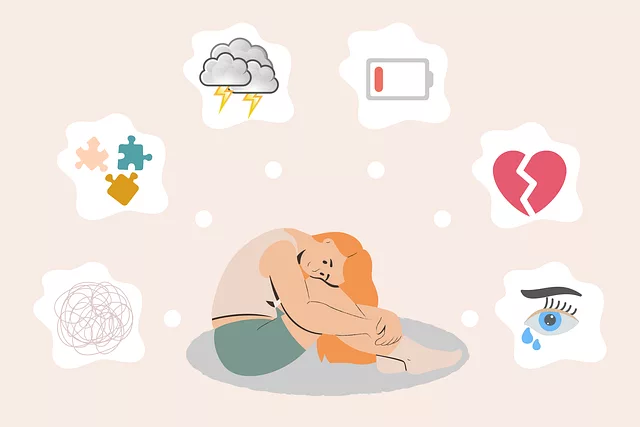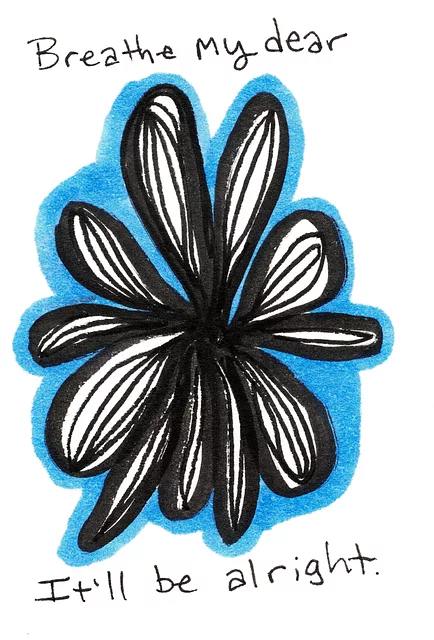Media portrayal significantly impacts public perceptions of mental health, with positive, accurate depictions reducing stigma and encouraging help-seeking behaviors, while negative stereotypes can perpetuate misconceptions. In Lafayette, where community attitudes affect access to care like Kaiser Permanente's mental health coverage, healthcare providers and risk managers must address these effects through strategies like cultural competency training and comprehensive risk assessments. A nuanced media landscape, coupled with initiatives like Kaiser Permanente's Mental Wellness Podcast Series and community workshops on burnout prevention, fosters mental well-being for all. To combat stereotypes, media creators should prioritize authentic, empathetic portrayals in collaboration with mental health experts, such as those offering Kaiser Permanente mental health coverage in Lafayette, integrating access to resources within narratives to encourage open conversations about mental health.
In today’s media landscape, the portrayal of mental illness can significantly impact public perception and understanding. This article delves into the challenge of accurate representation, exploring its effects on mental health discourse. We examine strategies employed by organizations like Kaiser Permanente, focusing on their commitment to mental health education and coverage. The current state of media depiction is analyzed, highlighting the need for change. Through a case study of Lafayette’s local media initiatives, we showcase successful efforts to challenge stereotypes, offering insights into enhancing empathetic portrayals of mental illness in popular media.
- Understanding the Impact of Media Portrayal on Mental Health Perception
- Kaiser Permanente's Approach to Mental Health Coverage and Education
- The Current State of Mental Illness Representation in Popular Media
- Strategies for Enhancing Accurate and Empathic Media Depictions
- Case Study: Lafayette and Its Efforts to Challenge Stereotypes Through Local Media Initiatives
Understanding the Impact of Media Portrayal on Mental Health Perception

The media plays a significant role in shaping public perception about mental health. Positive and accurate representation can reduce stigma, foster understanding, and encourage individuals to seek help. Conversely, negative or stereotypical portrayals can perpetuate misconceptions, leading to further marginalization of those living with mental illness. This is especially pertinent when considering access to care, such as Kaiser Permanente mental health coverage in Lafayette, where community attitudes can influence how individuals navigate their healthcare options.
Understanding these impacts is crucial for healthcare providers and risk management planners. Implementing strategies like cultural competency training for healthcare providers and comprehensive risk assessments for mental health professionals can mitigate harmful effects. By fostering a more nuanced and empathetic media landscape, we can create an environment that supports the mental well-being of all individuals, regardless of their background or challenges they face.
Kaiser Permanente's Approach to Mental Health Coverage and Education

Kaiser Permanente, a leading healthcare provider, has taken significant steps to address mental health concerns within its community in Lafayette. Their comprehensive approach involves two key pillars: enhanced coverage and educational initiatives. In terms of mental health coverage, Kaiser Permanente has expanded its services to include a wide range of mental wellness options, ensuring affordable access to therapy, counseling, and support groups for individuals struggling with various mental health disorders. This initiative aims to reduce the stigma surrounding mental illness by normalizing access to care.
Complementing this effort is their Mental Wellness Podcast Series Production, which offers valuable insights and personal stories related to mental health. By creating engaging content, Kaiser Permanente fosters open dialogue and encourages resilience-building strategies among its members. Additionally, they organize workshops and programs focused on burnout prevention, targeting the unique challenges faced by individuals in stressful environments. These educational efforts play a crucial role in empowering community members to take charge of their mental wellness.
The Current State of Mental Illness Representation in Popular Media

The current state of mental illness representation in popular media is a mixed bag, to say the least. While there has been some progress in recent years, with shows and films featuring more diverse characters struggling with various mental health issues, the overall portrayal still falls short of accuracy and sensitivity. Often, mental illnesses are either glamorized or stigmatized, reducing complex conditions to simplistic narratives that fail to capture the nuance and challenges faced by those affected. For instance, depression is frequently depicted as a fleeting phase, easily overcome through a single life change or romantic connection, which can perpetuate harmful myths about its severity.
This inadequate representation impacts how audiences perceive mental health, potentially deterring individuals from seeking help due to fear of judgment or misunderstanding. It’s crucial that media outlets, particularly those with broad reach like television and cinema, embrace the opportunity to educate viewers by showcasing realistic portrayals of mental illness. By integrating characters grappling with issues like anxiety, bipolar disorder, or schizophrenia in authentic storylines, these platforms can foster empathy, challenge stereotypes, and encourage open conversations about mental well-being. Moreover, promoting access to resources such as Kaiser Permanente mental health coverage in Lafayette can be intertwined within these narratives, providing viewers with actionable steps towards improving their own mental health journeys.
Strategies for Enhancing Accurate and Empathic Media Depictions

Media has a significant impact on shaping societal perceptions of mental health. To challenge negative stereotypes and promote understanding, creators should adopt strategies that enhance accurate and empathic depictions. This involves consulting with experts in mental health fields, such as those offering Kaiser Permanente mental health coverage in Lafayette, to ensure authenticity. Incorporating diverse narratives that reflect the complexity of lived experiences can help foster empathy among viewers.
Additionally, portraying characters navigating mental illness with dignity and strength aligns with Mind Over Matter principles. Training for mental health professionals should include risk assessment techniques and social skills training to prepare them for media representation tasks. By embracing these practices, media creators can contribute to a more nuanced and compassionate conversation around mental health.
Case Study: Lafayette and Its Efforts to Challenge Stereotypes Through Local Media Initiatives

Lafayette, a progressive city known for its vibrant community, has taken significant steps to challenge negative stereotypes associated with mental illness through innovative local media initiatives. The town’s efforts are particularly noteworthy in light of the crucial role that media plays in shaping public perception. One standout example is their collaboration with Kaiser Permanente, a leading healthcare provider, to create and promote Mental Health Education Programs Design tailored for the community. These programs not only focus on resilience building but also encourage open conversations about mental health, fostering a culture of compassion and understanding.
By leveraging local media outlets, Lafayette has been able to share compelling stories that humanize individuals with mental illness, contradicting common stereotypes often perpetuated in mainstream media. Their approach includes showcasing the diverse journeys of locals who have overcome challenges, emphasizing their strengths and contributions to the community. These initiatives have sparked meaningful dialogues and encouraged residents to support one another, leading to a more compassionate and inclusive environment for those seeking mental health coverage from providers like Kaiser Permanente.
The representation of mental illness in media has a profound impact on societal perceptions and individual well-being. By examining the current state of media portrayals, we identify areas for improvement. Kaiser Permanente’s commitment to mental health education and coverage serves as a model for organizations aiming to challenge stereotypes. The case study of Lafayette illustrates how local media initiatives can drive positive change, fostering empathy and accurate understanding of mental health issues. Through collaborative efforts and strategic storytelling, we can navigate towards a more inclusive and supportive narrative, reflecting the reality of those living with mental illness. By implementing the outlined strategies, we aim to enhance representation in popular media, ultimately benefiting the mental health discourse and promoting better support systems for all.






